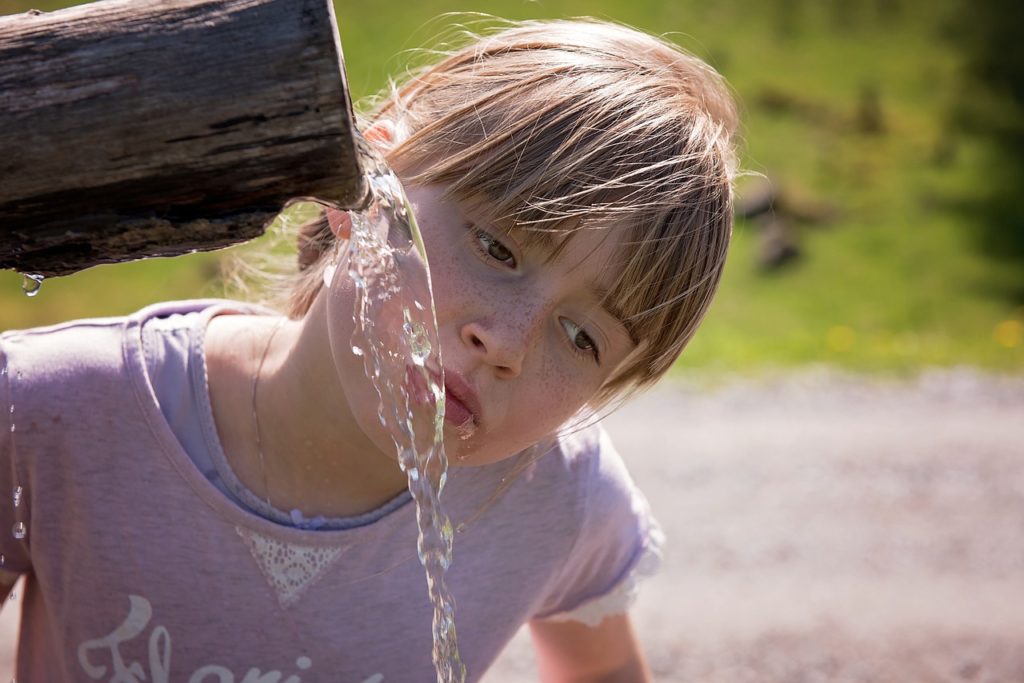
The body constantly loses water throughout the day, mainly through urine and sweat however likewise from regular body functions like breathing. To prevent dehydration, you need to get lots of water from drink and food every day.
There are various viewpoints on just how much water you need to be consuming every day.
Health professionals commonly suggest 8 8-ounce glasses, which equals about 2 liters, or half a gallon a day. This is called the 8 × 8 guideline and is very simple to remember.
Nevertheless, some specialists believe that you need to drink on water constantly throughout the day, even when you’re not thirsty.
Just like most things, this depends on the person. Many aspects (both internal and external) ultimately impact just how much water you need.
This article takes a look at some water intake studies to separate fact from fiction and describes how to quickly remain well hydrated for your individual needs.
How much water do you need?
Just how much water you need depends upon a great deal of things and varies from person to person. For adults, the basic recommendation from The U.S. National Academies of Sciences, Engineering, and Medication has to do with:
- 11.5 cups (2.7 liters) a day for females
- 15.5 cups (3.7 liters) a day for males
This includes fluids from water, beverages like teas and juice, and from food. You get approximately 20 percent of your water from the foods you eat (1, 2).
You might need more water than another person. How much water you require likewise depends on:
- Where you live. You will need more water in hot, humid, or dry locations. You’ll also need more water if you live in the mountains or at a high altitude (3Trusted Source).
- Your diet plan. If you consume a lot of coffee and other caffeinated beverages you might lose more water through additional urination. You will likely likewise need to consume more water if your diet plan is high in salty, spicy, or sugary foods. Or, more water is essential if you do not eat a lot of hydrating foods that are high in water like fresh or cooked vegetables and fruits.
- The temperature or season. You might need more water in warmer months than cooler ones due to sweating.
- Your environment. If you spend more time outdoors in the sun or hot temperature levels or in a heated space, you might feel thirstier faster.
- How active you are. If you are active during the day or walk or stand a lot, you’ll need more water than somebody who’s sitting at a desk. If you exercise or do any extreme activity, you will require to drink more to cover water loss.
- Your health. If you have an infection or a fever, or if you lose fluids through vomiting or diarrhea, you will need to consume more water. If you have a health condition like diabetes you will also need more water. Some medications like diuretics can also make you lose water.
- Pregnant or breastfeeding. If you’re pregnant or nursing your infant, you’ll require to consume extra water to remain hydrated. Your body is doing the work for 2 (or more).
SUMMARY
Many elements affect just how much water you require to stay healthy such as your health, activity, and environment.
Does water consumption impact energy levels and brain function?
Lots of people declare that if you do not stay hydrated throughout the day, your energy levels and brain function begin to suffer.
There are plenty of research studies to support this.
One research study in ladies revealed that a fluid loss of 1.36 percent after workout impaired mood and concentration and increased the frequency of headaches.
Another study in China that followed 12 males in university discovered that not consuming water for 36 hours had visible impacts on tiredness, attention and focus, reaction speed, and short-term memory.
Even moderate dehydration can minimize physical performance. A clinical research study on older, healthy guys reported that simply a 1 percent loss of body water lowered their muscle strength, power, and endurance.
Losing 1 percent of body weight may not look like a lot, however it’s a substantial quantity of water to lose. This typically happens when you’re sweating a lot or in a hot space and not drinking sufficient water.
SUMMARY
Mild dehydration triggered by exercise or heat can have unfavorable impacts on both your physical and psychological performance.
Does consuming a great deal of water help you reduce weight?
There are numerous claims that consuming more water may reduce body weight by increasing your metabolism and suppressing cravings.
According to a study, consuming more water than usual associated to a decline in body weight and body structure scores.
Another evaluation of research studies found that persistent dehydration was related to weight problems, diabetes, cancer, and heart disease.
Researchers in another older study approximated that drinking 68 ounces (2 liters) in one day increased energy expenditure by about 23 calories daily due to a thermogenic response, or a much faster metabolism. The quantity was incremental however could build up in time.
Consuming water about a half hour before meals can also decrease the number of calories you end up consuming. This might happen because it’s easy for the body to mistake thirst for appetite.
One research study showed that individuals who drank 17 ounces (500 mL) of water before each meal lost 44% more weight over 12 weeks, compared to those who didn’t.
In general, it seems that drinking adequate amounts of water, particularly prior to meals, might provide you a boost in handling appetite and preserving a healthy body weight, particularly when integrated with a healthy consuming plan.
What’s more, drinking plenty of water has a variety of other health benefits.
SUMMARY
Consuming water can trigger slight, momentary boosts in metabolism, and drinking it about a half hour prior to each meal can assist you eat less calories.
Both of these impacts can add to weight loss in some individuals.
Does more water aid prevent health issue?
Drinking enough water is needed for your body to work in general. Several health problems may likewise react well to increased water intake:
- Irregularity. Increasing water consumption can help with constipation, an extremely typical issue.
- Urinary system infections. Current studies have actually revealed that increasing water consumption may assist avoid repeating urinary tract and bladder infections.
- Kidney stones. An older study concluded that high fluid consumption reduced the risk of kidney stones, though more research is needed.
- Skin hydration. Studies show that more water results in better skin hydration, though more research study is needed on improved clearness and impacts on acne.
SUMMARY.
Drinking more water and staying effectively hydrated may aid with some illness, such as constipation, urinary and bladder infections, kidney stones, and skin dehydration.
Do other fluids count toward your total?
Plain water is not the only beverage that adds to your fluid balance. Other beverages and foods can have a significant impact.
One myth is that caffeinated drinks, such as coffee or tea, don’t assist you hydrate due to the fact that caffeine is a diuretic.
In fact, research studies show that the diuretic effect of these beverages is weak, however they can cause additional urination in some people. Even caffeinated beverages assist add water to your body overall.
A lot of foods consist of water in differing levels. Meat, fish, eggs, and particularly vegetables and fruits all include water.
Together, coffee or tea and water-rich foods can help keep your fluid balance.
SUMMARY.
Other beverages can contribute to fluid balance, consisting of coffee and tea. A lot of foods also consist of water.
Indicators of hydration.
Keeping water balance is vital for your survival.
For this reason, your body has a sophisticated system for managing when and how much you drink. When your total water content goes listed below a particular level, thirst begins.
This is thoroughly stabilized by systems comparable to breathing– you don’t need to purposely consider it.
Your body knows how to balance its water levels and when to indicate you to drink more.
While thirst may be a dependable sign of dehydration, counting on sensation thirsty may not be adequate for optimum health or workout performance.
At the time thirst strikes, you may be currently feeling the effects of too little hydration such as tiredness or headaches.
Using your urine color as your guide can be more useful to understand if you’re consuming enough Go for pale, clear urine.
There truly is no science behind the 8 × 8 guideline. It is entirely approximate. That stated, certain circumstances might require increased water intake.
The most crucial one might be throughout times of increased sweating. This consists of workout and hot weather, especially in a dry climate.
If you’re sweating a lot, make certain to replenish the lost fluid with water. Professional athletes doing long, intense workouts may also need to replenish electrolytes, like salt and other minerals, in addition to water.
Your water require increases during pregnancy and breastfeeding.
You likewise require more water when you have a fever and when you’re vomiting or have diarrhea. If you desire to drop weight, think about upping your water intake too.
Furthermore, older people may need to purposely view their water intake because the thirst mechanisms can begin to malfunction with aging. Research studies reveal that grownups over 65 years of ages are at a higher danger for dehydration.
SUMMARY.
Many people do not require to focus too much on their water consumption, as the body has an automated thirst signal.
Particular situations do call for increased attention to how much water you’re drinking.
At the end of the day, no one can inform you precisely just how much water you need. This depends on many aspects.
Try experimenting to see what works best for you. Some individuals might work better with more water than usual, while for others it just leads to more regular journeys to the restroom.
If you want to keep things easy, these standards must apply to the majority of people:
- Consume typically adequate throughout the day for clear, pale urine.
- When you’re thirsty, beverage.
- During high heat and exercise and other pointed out indications, make sure to drink enough to make up for the lost or extra needed fluids.
- That’s it!
Read also: 12 Easy Ways to Consume More Water
Facebook Comments

One thought on “How Much Water Should You Consume Per Day?”
Comments are closed.